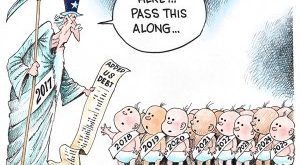Τα επιχειρηματικά think tanks δεν φημίζονται ούτε για την ανιδιοτέλεια ούτε φυσικά για την αξιοπιστία τους. Το ΙΟΒΕ αποτελεί κορυφαίο δείγμα αυτής της περίπτωσης. Κανείς μπορεί να κάνει ταπετσαρία σπιτιού, όχι δωματίου, με τα παλιόχαρτα αναλύσεων του που αφενός εξυπηρετούν τα συμφέροντα των ιδιοκτητών του (του ΣΕΒ) και αφετέρου έχουν διαψευστεί παταγωδώς. Τελευταίο δείγμα η σήμερα διαφημιζόμενη μελέτη για την αξιοποίηση της περιουσίας του Ελληνικού Δημοσίου...
Read More »Open thread July 17, 2020
The climate emergency after the pandemic
In an excess of zeal, I’m planning an Australia-specific book (working title, Australia after the Apocalypse: rebuilding a livable future) which will deal with the social, cultural and economic implications of the bushfire and pandemic catastrophes. This will complement The Economic Consequences of the Pandemic which will be global in its scope, but more narrow in its focus on economic issues. Over the fold, the opening section of a chapter on the climate emergency Among the...
Read More »Rethinking public debt
from Lars Syll Public debt is normally nothing to fear, especially if it is financed within the country itself (but even foreign loans can be beneficent for the economy if invested in the right way). Some members of society hold bonds and earn interest on them, while others pay taxes that ultimately pay the interest on the debt. The debt is not a net burden for society as a whole since the debt ‘cancels’ itself out between the two groups. If the state issues bonds at a low-interest rate,...
Read More »The stock market and MMT: the Dow Is not your friend
from Dean Baker It is standard for economic reporters to treat higher stock prices as good news. A rising stock market is often touted in the same way that job gains or GDP growth are touted, as evidence of a stronger economy. This can be true. When the economy is growing at a healthy pace, the stock market is usually rising also. But the link is far more tenuous than is generally recognized. The market is in principle a measure of expected future profits. Policies that redistribute...
Read More »Hard-hat utopians
That’s the title of my latest piece in Inside Story, pointing that, even though the occupations most affected by the Covid pandemic are dominated by women and young people, government responses have been focused on ‘hard hat’ sectors, mainly employing prime-age men. I appeared before a Committee of the Queensland Parliament making this point. I don’t think I had a lot of impact, but I will keep on pushing. Share this:Like this:Like Loading...
Read More »More Complexity
from Peter Radford Economists have been talking about complexity for a very long time. This may surprise many of you given the state of mainstream economics, but it is true. A good place to discover a preliminary history of complexity in economics would be the short volume edited by David Colander published in 2000. The papers it contains were all presented at a History of Economics Society Conference in 1998. Colander provides a good introduction and tries to put complexity into the...
Read More »The Fiscal Deficit, Modern Monetary Theory and Progressive Economic Policy
Modern Monetary Theory or MMT has crept in from the academic margins to become an influential doctrine in progressive policy circles in the United States. Both Elizabeth Warren and Bernie Sanders drew on the ideas of MMT to shape their ambitious public spending platforms. MMT has been cited as one way to fund a Green New Deal, in combination with progressive tax reform. It is safe to say that most Canadian progressives are not debating the finer points of monetary and...
Read More »The Fiscal Deficit, Modern Monetary Theory and Progressive Economic Policy
Modern Monetary Theory or MMT has crept in from the academic margins to become an influential doctrine in progressive policy circles in the United States. Both Elizabeth Warren and Bernie Sanders drew on the ideas of MMT to shape their ambitious public spending platforms. MMT has been cited as one way to fund a Green New Deal, in combination with progressive tax reform. It is safe to say that most Canadian progressives are not debating the finer points of monetary and...
Read More » Heterodox
Heterodox

